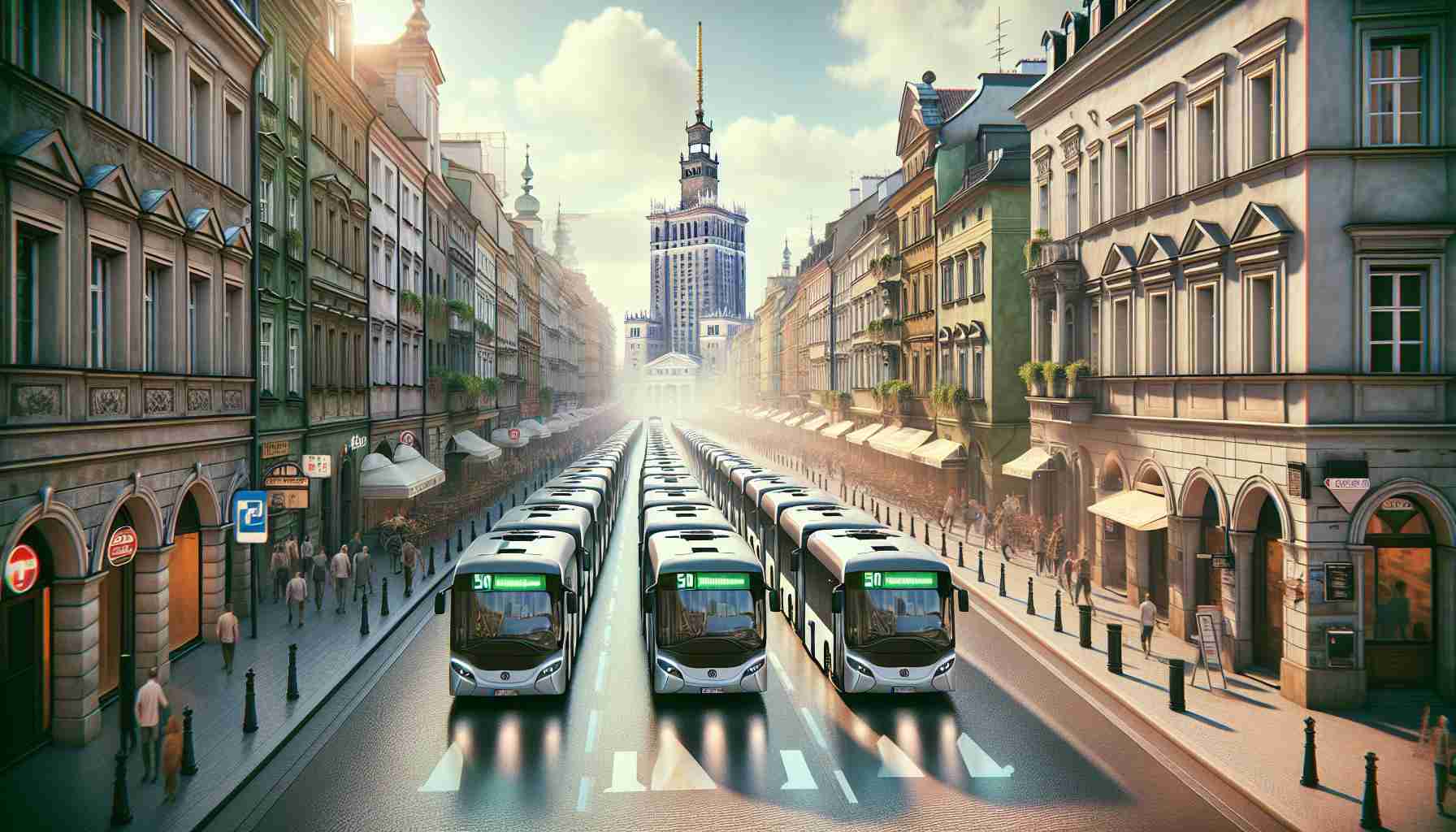- Warsaw is enhancing its public transportation with the addition of 50 Solaris Urbino 18 electric buses.
- The buses feature advanced technology, including a modular drive system and the latest Solaris High Energy batteries.
- This upgrade will increase the fleet of electric buses in Warsaw from 163 to 224.
- Solaris and MZA Warsaw have a long-standing partnership, having supplied nearly 1,350 buses over 28 years.
- The initiative aims to provide an efficient and enjoyable travel experience while significantly reducing carbon emissions.
In an electrifying step towards a sustainable future, Warsaw’s public transport system is set to get a major upgrade with the addition of 50 sleek Solaris Urbino 18 electric buses. Signed on February 3rd, this contract marks a bold commitment to zero-emission mobility that enhances the city’s green transit revolution.
Imagine commuting in buses that blend modern design with cutting-edge technology! Each Solaris Urbino 18 is equipped with a modular drive system featuring advanced roof-mounted components and the latest generation of Solaris High Energy batteries. This means less congestion on board and room for up to 103 passengers, delivering comfort on every ride.
With a rich history spanning 28 years, Solaris and MZA Warsaw have teamed up to transform urban transport, supplying nearly 1,350 buses so far. Since venturing into electric buses in 2015, they’re not just keeping pace but speeding ahead. The fleet of 163 electric buses will swell to 224 with this latest order, solidifying Warsaw’s role as a pioneer in sustainable public transit.
The initiative doesn’t just promise a greener city; it also offers an efficient and enjoyable travel experience, all while reducing carbon emissions. So keep your eyes peeled for these new electric giants gliding through the streets of Warsaw – the future is indeed bright and green!
Key Takeaway: Warsaw is doubling down on sustainability with the launch of 50 new electric buses, taking significant strides toward a cleaner, more efficient public transportation system.
Electrifying Transformation: Warsaw’s Leap into Sustainable Public Transport!
Introduction
In an ambitious move towards sustainability, Warsaw’s public transportation system is set to significantly upgrade its fleet with the addition of 50 cutting-edge Solaris Urbino 18 electric buses. This initiative, signed on February 3rd, aims to bolster the city’s commitment to zero-emission mobility and reinforce its status as a leader in green transit innovations.
Key Features of the Solaris Urbino 18
The Solaris Urbino 18 buses boast a modular drive system supported by advanced roof-mounted components and the latest Solaris High Energy batteries, optimizing the bus design for efficiency and comfort. They can accommodate up to 103 passengers, providing ample space for commuters while ensuring a modern aesthetic.
Moreover, these buses include:
– Regenerative braking technology for improved energy efficiency.
– Enhanced air filtration systems to improve air quality.
– State-of-the-art infotainment systems for a better passenger experience.
Market Forecasts
As cities around the globe prioritize climate action, the electric bus market is projected to grow significantly. By 2026, the global electric bus market is estimated to reach over $40 billion, driven by increasing investments from city governments and advancements in battery technology.
Pros and Cons of the New Electric Buses
Pros:
– Substantial reduction in carbon emissions.
– Lower operational costs over time due to electric drivetrain efficiency.
– Improved passenger experience with modern amenities.
Cons:
– High initial capital investment compared to diesel buses.
– Potential range anxiety in longer routes without sufficient charging infrastructure.
Use Cases and Limitations
The Solaris Urbino 18 buses will primarily serve high-demand urban routes, facilitating quicker and cleaner transit for daily commuters. However, the effectiveness of these electric buses can be limited by:
– The need for extensive charging infrastructure throughout the city.
– The performance of batteries in extreme weather conditions.
Compatibility and Pricing
The Solaris Urbino 18 buses are compatible with various public transport networks that are transitioning to electric fleets. With prices ranging around €700,000 to €800,000 per unit, cities need to carefully plan their budgets to incorporate these innovative vehicles.
Insights and Innovations
This project reflects a broader trend across Europe, where many cities are investing in electric public transport to tackle urban pollution. Innovations such as vehicle-to-grid technologies are emerging, allowing electric buses to feed energy back into the grid, enhancing efficiency and sustainability.
Security Aspects
Security features like advanced GPS tracking, real-time monitoring, and contactless payment systems ensure passenger safety and convenience while traveling in these electric buses.
Sustainability Efforts
Warsaw’s initiative with electric buses is a part of its commitment to the European Green Deal and aims to enhance local air quality and create a sustainable urban environment.
Related Questions
1. How do electric buses impact city infrastructure?
Electric buses require considerable changes to existing transit infrastructure, including the installation of charging systems and maintenance facilities to support a larger fleet of electric vehicles.
2. What are the environmental benefits of switching to electric buses?
Electric buses significantly decrease greenhouse gas emissions, reduce noise pollution, and contribute to better air quality in urban areas.
3. How does Warsaw’s electric bus initiative compare to other cities?
Many cities, such as Amsterdam and London, have already adopted electric buses at a larger scale. However, Warsaw is leading with its aggressive expansion plan, forecasted to have one of the highest ratios of electric buses in Europe.
Explore More
For further insights on sustainable transport initiatives, check out Solaris Bus for comprehensive information on electric buses and their integration into public transportation.












